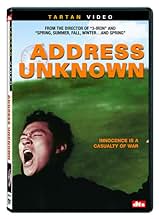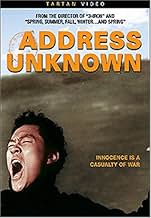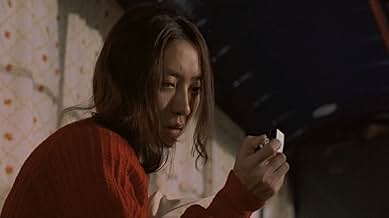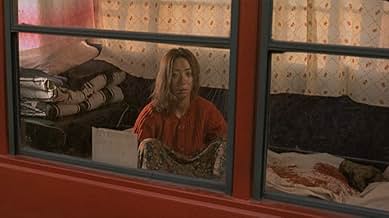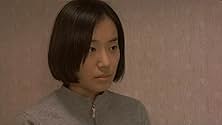Ajouter une intrigue dans votre langueRomances end in blood and the frail hopes of individuals are torn apart in a vile karmic continuity of colonialism, civil war and occupation. After surviving Japanese colonization, Korea bec... Tout lireRomances end in blood and the frail hopes of individuals are torn apart in a vile karmic continuity of colonialism, civil war and occupation. After surviving Japanese colonization, Korea became the first war zone of the Cold War. The legacy of war remains today in this divided co... Tout lireRomances end in blood and the frail hopes of individuals are torn apart in a vile karmic continuity of colonialism, civil war and occupation. After surviving Japanese colonization, Korea became the first war zone of the Cold War. The legacy of war remains today in this divided country.
- Réalisation
- Scénario
- Casting principal
- Récompenses
- 4 victoires et 5 nominations au total
Avis à la une
In all of the Kim Ki-duk films I have seen (The Isle, Address Unknown, Bad Guy) what lies on the surface differs greatly from what lies beneath it. He is working in a language of metaphor and allegory with characters that range from caricature to archetype to fodder. By fodder I mean they are impenetrable and near impossible to empathize/sympathize with for the sole reason that emotional attachment is not the director's intention. He is creating a fictional world made to comment on the world we live in.
By exploring the eclectic residents of an isolated South Korean village in close proximity to an American military base Ki-duk is dealing with a number of issues such as globalization (the base, the bullies who moved to America), language (the theme of English, the comic interlude of the Playboy translation), gender (obvious), race (obvious), history (that family whose father turned out to be a traitor, the constant references to the past from the veterans), tradition (the archery), relationships (Korean girl and U.S. solider), war (obvious) and violence (obvious). The bleak, violent, at times repulsive world the film takes place in is so over-the-top that the audience can't help but think that it is just a means to an end.
In films like `The Isle' and `The Bad Guy' the black humour and sarcasm are more evident. `Address Unknown' is a tad more subtle but there are more than enough hints to indicate the film should not be taken at face value. An excellent example is the constant, almost laughable violence.
Kim Ki-duk is one of a handful of directors striving to create intelligent cinema that is accessible as well. The East is bursting at the seams with talent and I really hope it starts to get the recognition it deserves.
This whole film is about a bunch of people in South Korea who all hate themselves or each other, who are miserable and mean and use every opportunity to hurt or humiliate each other.
Non of them is sympathetic, not even the ones who are clearly supposed to be rather sympathetic (the women, as expected).
Men seem to have given up on things and women all want to learn english and move to america, the holy and chosen land where rivers are filled with milk and honey, or at least make out with an american soldier who is stationed in South Korea in order to humiliate their husbands or hurt their fathers or brothers.
There isn't even any plot, let alone a resolution. You get implicated animal cruelty and animal abuse at times when characters don't insult each other or proceed to kill their mothers or puppies.
I don't think I've gotten softer (although I really appreciate some nature documentary more than ever now) but I kinda grew out of watching people or even animals suffer, even there is a supposed touch of social commentary in it.
me sick...and saying that I experienced physical pain is not a lie.
There is no happiness in this film. Everyone is depressed and
everyone has difficult problems to deal with, and those problems
don't get solved, but rather get worse during the film. But this is
why I love it! A film that can give you such strong feelings, even if
the strong feelings are depression and pain, is a GOOD film!
Might be good to see this if you think YOU have problems. =)
Much as I enjoyed watching it, I won't try and argue that watching THE ISLE is a 'pleasant' experience - not one to leave you with a smile, so I was prepared for something a little bit serious and grim with ADDRESS UNKNOWN.
It is not a little bit serious and grim at all... it is *completely* serious and amazingly grim.
Kim Ki-Duk is less interested in exploring the somewhat global issues of human feelings here, but instead wants to explore the feelings of a nation - Korea, still living in the shadow of the Korean war. The characters here come across as a little apersonal (it's ok, I just invented it) because they are embodiments of the country's experience... the division, the loss of autonomy, the dehumanisation that people feel, caught up in the conflicts between North and South and between Capitalism and Communism. Obviously to suggest that this was a universal Korean experience would be unreasonable, though Kim Ki-Duk is not interested in exploring balancing factors in this particular movie. People suffer. And suffer. And suffer. And then they suffer for a while. He is relentless in his examination of the pain that he clearly feels, for himself and for his country.
It must be said that I know almost nothing about Korean history (though I am learning a lot as I type!), or of contemporary Korean society, so I don't know how common the feelings that Kim Ki Duk expresses here are, or how realistic his assessment of Korea's post war condition is. It all feels very believable, very convincing... but certainly none of the Korean people I have met are quite as utterly miserable as they must be if ADDRESS UNKNOWN were an accurate depiction of their lives.
I think there is no doubt that for at least some people, and some communities, the feelings that Kim Ki Duk brings to the fore in the movie represent real feelings and real situations. But I think that it must be assumed that it is not an even-handed assessment of the situation, that he was quite certain what he wanted to say and permitted no deviation from it. In a way this is the movie's undoing... it is so relentless in its pursuit that it becomes too easy to get detached from it, to treat it as political allegory rather than a tale of human hardship. A little more warmth, a little bit of humour, maybe just one or two moments where at least one character was *slightly* happy... and I would have been much more able to bond with them, and their tragedies and miseries would have been that much more poignant as a result.
A fairly small matter, and to a degree this observation may simply be an observation that I am not Korean. The movie is a very personal look at the feelings and circumstances of a nation, and having had no comparable experience myself, it is obvious that I'm going to struggle to fully relate.
If I couldn't empathise with the characters though, I could at least sympathise with them. The characters themselves were good characters, and the performances were mostly very good. Notable exceptions are the American soldiers in the movie, whose English dialogue and delivery is really quite embarrassingly bad The movie is very light on dialogue - little that is important is expressed through words, because it doesn't need to be. Always a good thing in a movie.
It is the younger characters of the movie that are centre stage, those who were born years after the Korean war ended, but are still suffering its consequences. It's always refreshing to see young actors deliver mature performances, and this is one such example.
THE ISLE probably impacted me mostly because of the visuals - the beautifully photographed and haunting environment in which the movie took place. ADDRESS UNKNOWN is not nearly as pretty, which can partly be based on location, but also the fact that the style is a lot more realistic, gritty even, as opposed to THE ISLE's abstractness. It is still well filmed though.
I wrote of THE ISLE after seeing it:
"if you want to take away the beauty of his film, you have to be willing to pay the price of the horror"
ADDRESS UNKNOWN is a less successful movie for me because once you get past it's horror, instead of beauty you find there's just a bit more horror . OK, it's not as bad as that... but the tone is quite unremittingly bleak. I don't know whether to recommend the movie or not. I liked it, but I'm not sure how many others will. Definitely not a movie to put on to take your mind off a troublesome day anyway!
Le saviez-vous
- ConnexionsReferenced in Arirang (2011)
Meilleurs choix
- How long is Address Unknown?Alimenté par Alexa
Détails
- Durée1 heure 57 minutes
- Couleur
- Rapport de forme
- 1.78 : 1
Contribuer à cette page


